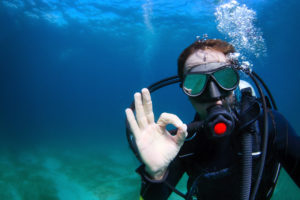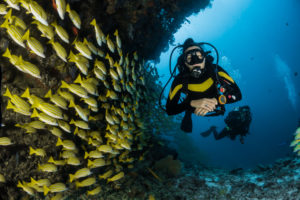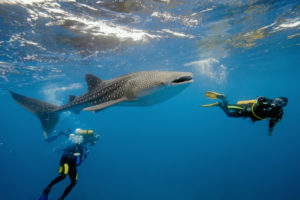Most divers enjoy diving with well-known buddies or a dive group in familiar surroundings. Although we may not need a guide on these dives, in unfamiliar waters, diving with a dive guide is always a good idea no matter who your buddies are. Dive guides know almost always know where to find those critters that are reliably in the same spot. Guides may even find the creatures that move around the site. Dive guides also help maintain everyone’s safety. To make your experience of diving with a dive guide as smooth and enjoyable as possible, here are a few tips for your consideration.
Prepare in advance
Safety is always the most important factor, and it begins with the buddy check and an overall gear check. Check for wear and tear, missing, broken or malfunctioning parts. This applies to rental gear as well as your own. If there are any problems, tell your guide before you leave for the dive so that you and your guide can fix any equipment issues. Doing all necessary checks and repairs before leaving for the site ensures that you have an uninterrupted, happy dive, and that your guide can continue their job on schedule.
Listen to the dive briefing
It is important to communicate properly with your guide, both before and during the dive. Listen attentively to the dive briefing, as it contains vital information about the dive site, what you’re likely to encounter, current weather and ocean conditions, approximate dive time and safety protocols. Guides will often cover hand signals during a briefing as well. If you’re rusty, your guide will be happy to review them with you.
 Maintain good communication
Maintain good communication
The subject of hand signals brings us to our next topic — communication. Good skills in this area are vital for every dive. Your guide might try to grab your attention if they find something interesting. Many guides bang their tank or shine a light to attract you. They’ll use hand signals to let you know about marine life or to ask questions and give instructions. Staying aware of communication methods not only makes a dive more fun, but also keeps you safer. If there after any dangers or problems, your guide will swiftly let you know. Equally, if you have an issue, you must tell your guide so that they can assist you. To maintain good communication, make sure you’ve reviewed hand signals as mentioned above and stay close to your guide and pay attention to them.
Don’t be messy
Excited, vacationing divers can be a little messy, but un-stowed gear can obstruct walkways, and dangling, unruly hoses can trip up fellow divers on the boat or on land. Leaving equipment laying around can also result in damaged or misplaced gear. Being messy with your equipment both before and after a dive creates extra work for the dive guides, as they are responsible for keeping everything tidy and in order. Do your best to keep your gear together, tidily stowed, and of course, washed, rinsed and put away after the dive.
 Follow the leader
Follow the leader
Be sure to follow your guide during the dive. Don’t fall too far behind or go ahead of the guide. They are there to lead you around the dive site, and cannot do so properly if you are ahead. They also struggle to see and keep an eye on you if you lag too far behind, so try to stay within reasonable eyesight of your guide. This will help to prevent divers from getting lost or separated from the group. Your safety and enjoyment are the guide’s priority, but if you can’t see them, they can’t see you. Check every few minutes where, in relation to yourself, your guide is. That way you’ll remain nearby should they call you over to look at an awesome creature.
Be mindful of yourself
Respect for the environment is just as important as manners towards marine animals. Make sure you know where you are in relation to your environment, and ensure that none of your equipment is hanging too far from your body, such as hoses, alternates and other accessories. These can accidentally damage coral or become stuck. Also, do your best to maintain good buoyancy. Your dive guide should lead you around areas that will cause the least disturbance to the marine environment, so do your best to follow while maintaining awareness for yourself.
 Respect the marine life
Respect the marine life
Close to almost every diver’s heart is respect for the sea and marine life. Part of your dive guide’s job is to teach respect for this environment, and to protect it while showing it to you. Respecting and protecting marine life is something all divers should aspire to, so this is not purely exceptional to diving with a dive guide. Do not touch, chase, scare or harass critters in any way. Guides should make this rule clear in their briefing and enforce it underwater. If your guide touches marine life to elicit a reaction, address the situation when you surface. Make it known that you’re not okay with the behavior.
Conserve and protect
Finally, as divers, we have a responsibility to the marine environment. Do your part to keep it clean and safe for the creatures that live within it. Many guides carry a mesh bag on dives to pick up trash and debris; consider doing the same when you dive. If you discover something that’s too big or too dangerous to remove, note where you spotted it and point it out to your dive guide. That way he or she can help take care of it later.




